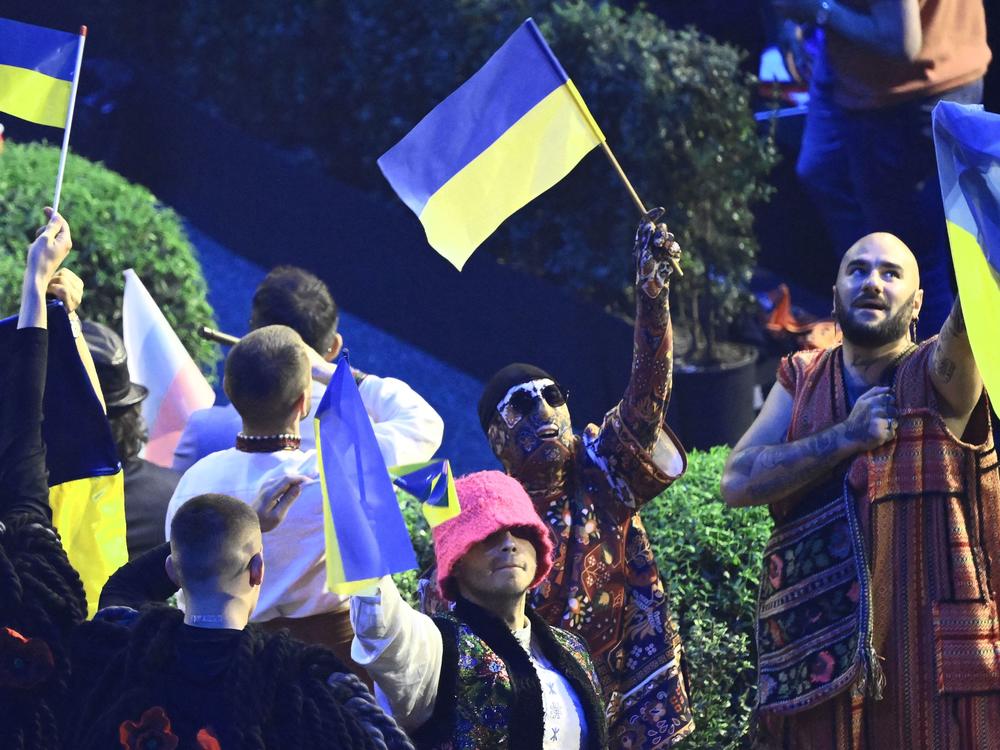Section Branding
Header Content
A fan-favorite band from Ukraine advances to the Eurovision grand final
Primary Content
Ten countries advanced last night from the first round of Eurovision semi-finals to the final round of the songwriting competition, which will take place on Saturday in Turin, Italy.
Among them was Ukraine, represented by rap-folk band Kalush Orchestra. The three-member group — with their iconic pink bucket hat, energetic breakdancer and colorful traditional clothing — is favored to win the competition, with bookmaker Parimatch Ukraine putting their odds at 73% on Wednesday. (Votes are cast by professional juries and viewers from the participating countries.)
They received a standing ovation after last night's performance, during which Ukraine's Eurovision commentator could be seen broadcasting from a bomb shelter. And it wasn't just Ukrainian fans rooting for them: Acts from other countries, including Lithuania and Iceland, showed their support for Ukraine with statements and symbols.
The core members of the group, which was founded as Kalush in 2019, are Oleh Psiuk, multi-instrumentalist Ihor Didenchuk, and dancer Vlad Kurochka, also known as MC Kilimmen.
They launched Kalush Orchestra, which combines hip-hop with elements of traditional Ukrainian folk music, in 2021 with additional musicians, including Tymofii Muzychuk, Vitalii Duzhyk, and Dzhonni Dyvny.
The band's Eurovision entry, "Stefania," is a unique earworm combining old Ukranian melodies and traditional flute with contemporary beats and rap. The performance itself included both folk dancing and break dancing, and the musicians wore a mix of embroidered Cossack shirts and modern streetwear.
Psiuk wrote "Stefania" about his own mother before Russia launched its full-scale invasion of Ukraine. Since then, many Ukrainians have come to associate the song — with translated lyrics like "I will always walk to you by broken roads" and "the field blooms, but she is turning gray" — with their own motherland.
"After it all started with the war and the hostilities, it took on additional meaning, and many people started seeing it as their mother, Ukraine, in the meaning of the country," Psiuk told the Associated Press last week. "It has become really close to the hearts of so many people in Ukraine."
The song has broad popularity in countries across northern Europe, where it's climbing up several Spotify charts.
While Eurovision calls itself a nonpolitical event, Russia's war in Ukraine has loomed large in the international competition. Organizers banned Russian acts back in February, and Kalush Orchestra replaced Ukraine's original contestant, Alina Pash, after the country's national broadcaster suspended her while investigating a 2015 trip she made to Crimea.
The all-male group needed special permission from Ukrainian authorities to travel to Italy for the contest, as the country has banned men of fighting age from leaving the country. One original band member stayed behind to fight, the AP reports, and all plan to return to Ukraine after Eurovision ends.
While they are hoping to boost Ukrainians' morale with a win, they have said in interviews that shining a global spotlight on the country's culture and identity is in itself a form of victory.
"We understand that we must be totally focused and concentrated, because we are here to show that Ukrainian culture and Ukrainian music exist," Psiuk said at a press conference, according to an English translation. "They are alive and they have a very beautiful and special signature. So we are totally focused on this purpose."
This story originally appeared in the Morning Edition live blog.
Copyright 2022 NPR. To see more, visit https://www.npr.org.

